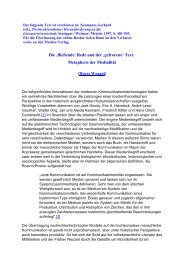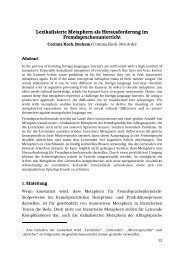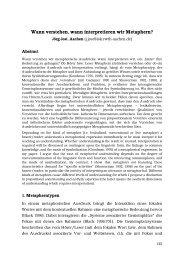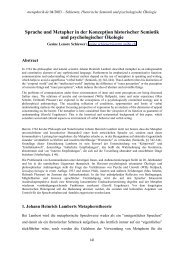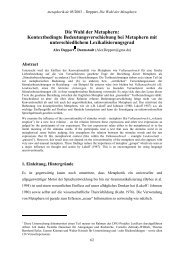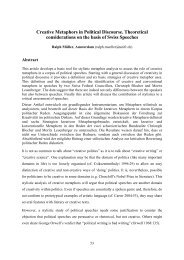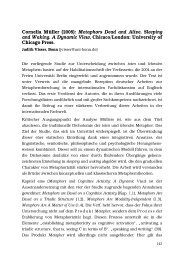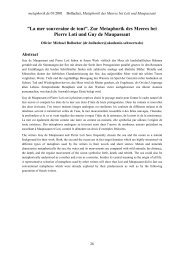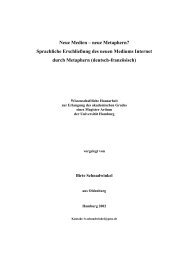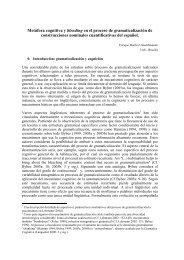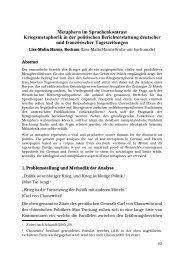The Sweet Smell of Red - An Interplay of ... - metaphorik.de
The Sweet Smell of Red - An Interplay of ... - metaphorik.de
The Sweet Smell of Red - An Interplay of ... - metaphorik.de
Create successful ePaper yourself
Turn your PDF publications into a flip-book with our unique Google optimized e-Paper software.
78<br />
<strong>metaphorik</strong>.<strong>de</strong> 18/2010<br />
interesting that all metaphorical forms are more or less restricted to the years<br />
1900-1938, which goes completely against the <strong>de</strong>velopment <strong>of</strong> the word in<br />
regard to the general number <strong>of</strong> occurrences. While its antonym duftend<br />
<strong>de</strong>creased in use toward recent times, stinkend increases, but has in the process<br />
seemingly lost the ability to be used metaphorically, at least no examples can<br />
be found within my 100 concordance lines.<br />
Wi 1917... unbelehrbar <strong>de</strong>r Meinung bleiben: daß auf <strong>de</strong>m gen Himmel<br />
stinken<strong>de</strong>n Sumpf von Faulheit und ... Ze 1923... im ganzen von einem<br />
stinken<strong>de</strong>n Geiz. Alle in diesem ...<br />
Ze 1938... <strong>An</strong>klageschrift als eine zum Himmel stinken<strong>de</strong> Lüge -. - ...<br />
<strong>The</strong>re are no other sense related pairs that have such a strong and obvious<br />
connotation as those four smell related words. <strong>The</strong> finding <strong>of</strong> synaesthetic<br />
combinations appeared rather strange consi<strong>de</strong>ring that taste is not one <strong>of</strong><br />
them, while the other way around – taste being in the source domain – is so<br />
frequent, which will be explained further in the following.<br />
8. Taste<br />
<strong>The</strong> words that have been chosen for the taste related word analysis are<br />
sweet/süß and sour/sauer. <strong>Sweet</strong> (0.035 times within 1000 running words)<br />
occurs far more frequently in the corpus than sour (0.0062 times) and is similar<br />
in this aspect to the German term süß (0.031), while the German sauer differs<br />
from its counterpart as it occurs quite more <strong>of</strong>ten with 0.016 times.<br />
8.1 sweet/süß<br />
<strong>The</strong> metaphorical use <strong>of</strong> sweet is compared to other sensory terms very<br />
common in English. Süß is even more frequently used in a metaphorical way<br />
then sweet and within those it occurs very <strong>of</strong>ten in combination with other<br />
sense modalities: in English 60 metaphorical against 40 literal uses could be<br />
found, while in German 77 were metaphorical and only 33 displayed the<br />
primary usage (taste). In both cases, the metaphorical version is obviously<br />
much more common than the literal one. Otherwise some substantial<br />
differences can be discovered. Out <strong>of</strong> the sixty concordance lines that show a<br />
metaphorical usage, only fourteen display strongly synaesthetic metaphors in<br />
English, which mostly display taste-smell combinations. Out <strong>of</strong> the four other



